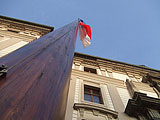Prague: The ‘Second Infiltration’
By Jeremy Druker for ISN
Over the last few weeks, the Czech press have given their readers the impression that the country is swarming with Russian agents, intent on infiltrating the highest spheres of the political and business worlds.
“The last soldier of the one-time superpower, the Soviet Union, whose divisions occupied Czechoslovakia for over 20 years, left the country in 1991,” read a 7 September front-page article in the country’s top selling serious newspaper, Mlada fronta DNES. “It’s now the year 2009 and Moscow, step by step, is acquiring the position in the Czech Republic that it vacated 18 years ago - this time not at all by way of tanks, but of economic influence.”
The impetus of that article and a series of others was further speculation over the reasons for the expulsion of two Russian diplomats this past spring. According to Mlada fronta, the media had incorrectly connected the incident only with the planned stationing of part of a US anti-missile defense shield in the Czech Republic.
Moscow has long opposed plans to station parts of the shield in the Czech Republic and Poland, its former satellites, and has claimed that one of the project’s real aims is to contain Russia. However, Mlada fronta said that interviews with a number of security experts and diplomats had revealed that the real reason for the expulsions was more likely economic espionage.
In late August, the weekly Respekt had said that its own investigation had uncovered an indirect connection between the expulsions and the high-profile arrest one year ago of Herman Simm, an Estonian senior defense official who had been passing along NATO secrets to the Russians for years. Information that Simms subsequently provided to his interrogators on the Russian spy network, Respekt wrote, eventually led to the decision to kick out the two diplomats.
The media’s speculation mirrors the conclusions emanating from the local intelligence community. At the end of August, the Czech BIS counter-intelligence service released its latest report on security threats, which accused Russia of using Soviet-era practices to gather information and influence public opinion.
The BIS also said that Russian agents had attempted to gain political friends and initiate contact with members of parliaments, their assistants, and personnel in the foreign relations departments of political parties, the Czech News Agency (CTK) reported.
Those types of charges continue to fuel theories about Russian plans for a quiet takeover of key strategic Czech companies, with political allies supposedly tipping off Russian agents about tender details, state contracts, and other insider information. Almost every week brings new speculation over Russian intensions to swoop in and buy segments of the energy sector, albeit with no concrete proof.
Shell reportedly wants to sell its 16 percent share in Ceska rafinerska, a refinery company. One of the main suitors? Supposedly Russian Lukoil, which recently expanded its local network of gas stations. The troubled Polish company PKN Orlen might want to sell its stake in Unipetrol, the Czech company that controls Ceska rafinerska. The likely suitor? Again the Russians. The list goes on.
Such worries about Russian expansion isn’t surprising when one considers that the Russian company TVEL will, beginning in 2010, start supplying the Czech nuclear power plant Temelin with fuel, replacing Westinghouse, the American firm; a Czech subsidiary of the Russian company OMZ will take part in additional work on Temelin; and Gazprom, the Russian gas giant, controls Vemex, the second largest importer of gas from Russia.
In response to charges of economic espionage and Kremlin-orchestrated takeovers, Russian government officials consistently deny interfering in the operations of supposedly private Russian companies. Yet until the cases of alleged economic espionage subside and the opaque structure of so many Russian companies involved in the energy sphere becomes more transparent, no one is going to believe that the heightened economic activity is purely commercial - especially the Czechs.

